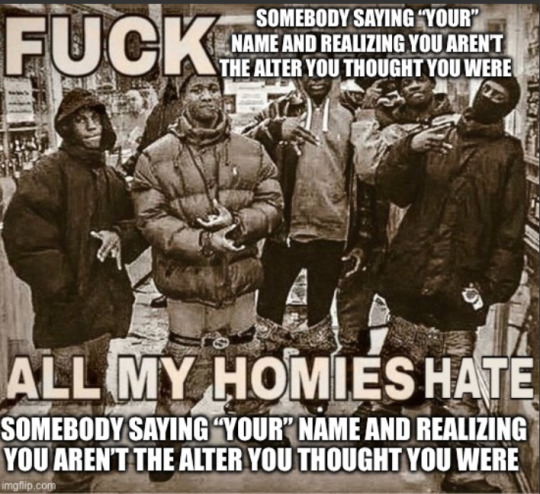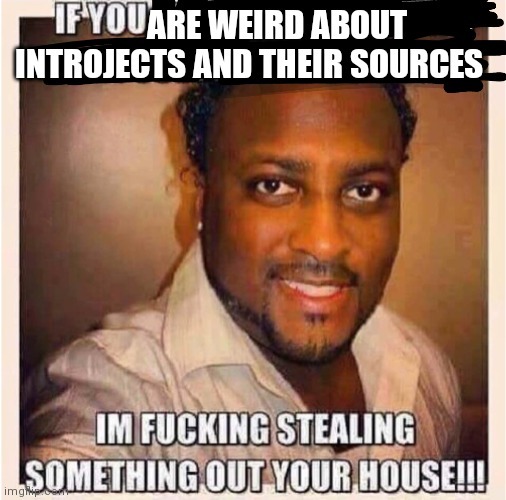Don't wanna be here? Send us removal request.
Note
disabled plural culture is your introject headmate's phantom pains mixing with the body's already-existing chronic pain - 🌈
.
46 notes
·
View notes
Text
I wish someone would call me by my name
Being called by your name, not the host’s name, for the first time is like

You know?
2K notes
·
View notes
Text
“You can’t be a system!! You and ___ both do this!!!”
We still share a brain.
“You and ____ LOVEEE this!!”
We still share a brain.
“You and ____ talk very similarly!!!”
We still share a brain.
3K notes
·
View notes
Text
Being a fictive is fucked up. Like you've experienced trauma that the body has not. The very nature of being a fictive is a new trauma. Getting ripped away from your world and your friends and loved ones and just dropped into the head of someone completely foreign. Genuinely horrifying.
(written by our host Noelle on behalf of our newly discovered fictive Naminé)
389 notes
·
View notes
Text
We have no concept of time
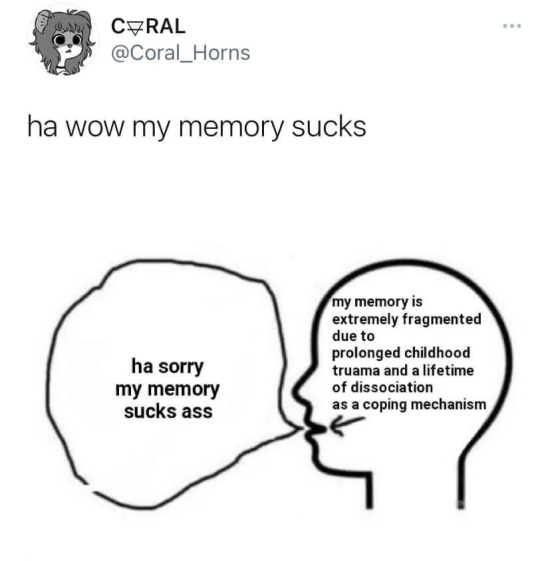
Also we have a discord and would love to make more system friends. If you're interested, feel free to DM and we can make a server. The only requirements are that you're respectful and accepting of introjects. If you use pluralkit, we can add that to the server as well. We'd love to hear from you!
–John
1K notes
·
View notes
Text
Shout out to the other chronically mentally ill systems who’s disorders and traumas have severely impacted your quality of life and functioning
shout out to polyfragmented or complex and highly complex did systems
shout out to the systems who are RAMCOA survivors, childhood sexual abuse survivors, or childhood torture survivors
shout out to systems diagnosed with other comorbid mental disorders
shout out specifically to systems with BPD🫂
shout out to systems who have lost relationships with people because of your mental health
shout out to the systems struggling with substance abuse issues or addiction
shout out to the systems who’ve been in and out of mental hospitals
shout out to fellow black systems and other poc systems with many intersecting marginalized identities
shout out to systems who can’t attend in real life school or are graduating late due to their mental health
shout out to the systems who can’t get a job or a drivers license
shout out to the systems who lost their childhood and teenage years due to constant mental health struggles
shout out to systems who have to take multiple medications for their disorders
shout out to the lonely systems who can hardly ever leave their homes and build friendships
shout out to the systems that struggle with the scars their sh addictions leave
shout out to systems who can’t take care of themselves without needing support
try to keep in mind that you are not the average persons, so we shouldn’t expect ourselves to be able to function just like the average person would. know you are all loved and are trying your best to navigate a society that wasn’t designed with poc, disabled, or neurodivergent people in mind. i wish you systems the bestest recovery possible and i’m sending much love and support.
527 notes
·
View notes
Text
Source-connected fictives are fine and you don't need to disconnect from your source fully (or really at all) if you don't want to or believe it will be bad for you. Recovery is good, but recovery doesn't look the same for everyone, the same applies to fictives/alters in general.
Stop being horrible to people who want to stay connected, it helps no one to act as though they're bad for this.
479 notes
·
View notes
Text
Shout-out to the intimidating alters. Shout-out to Protectors who are often rude or aggressive as part of their function. Shout-out to Gatekeepers who are often cold or uncaring as part of their function. Shout-out to the Caretakers who are often overly bearing or demanding as part of their function. Shout-out to the Persecutors who are often hostile or distrustful of others as part of their function.
932 notes
·
View notes
Text
Shout-out to systems who have alters based around horror. Shout-out to systems who have alters based around spiritual concepts. Shout-out to systems who have alters based around cultural urban legends and/or myths. Shout-out to systems who have alters based around their own horror creations. Shout-out to systems who have a large amount of alters based around horror.
181 notes
·
View notes
Text
when new alter fronts for the first time;;;

355 notes
·
View notes
Text
Dimensions of Fronting
In my Manifestations post, I used fronting as a catch-all term for any sort of physical attachment to the body.
I'd like to delve into that a bit more here, exploring language to better explain individual experiences of fronting and control over the body.
This isn't really intended for every day use, but is meant to better explain plural experiences of fronting in a more clear and more precise way.
Full body vs Locational Attachment
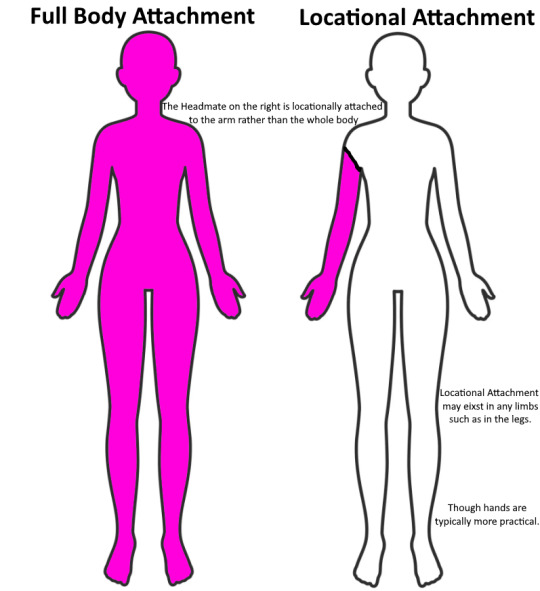
Full body attachment is, as expected, attachment to the entire body at once.
Locational Attachment is attachment to specific body parts such as only a hand or just the legs. When referencing locational attachment, it's usually useful to refer to the part of the body one is attached to.
Efferent vs Afferent Attachment
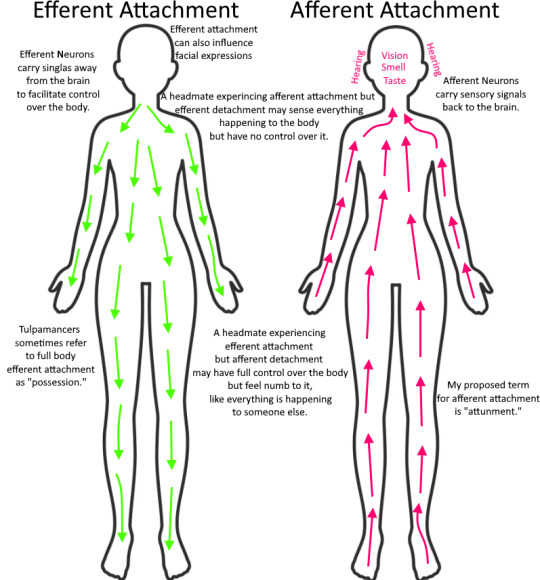
Besides simply being locational, attachment can come in afferent and efferent forms. Some nerves send signals from the brain to the body. Other nerves in the brain receive signals from the body.
Nerves responsible for sending signals from the brain to the body are called efferent nerves. These allow you to control the body. Nerves responsible for receiving signals are afferent. These allow you to sense things through the body.
Attachment can exist in both forms separately.
If a headmate feels like they're experiencing everything happening to the body but feel like somebody else is controlling it, they're experiencing afferent attachment with efferent detachment.
If a headmate is controlling the body but feels disconnected, as if everything is happening to somebody else, this is efferent attachment with afferent detachment.
Alternative Terminology:
The terms above are more technical, designed to help conceptualize the dimensions of fronting. For everyday use, I would recommend Possession and Attunement.
Possession referring to taking control of the body, attunement to receiving signals from its senses as if they were your own.
Solitary Attachment vs Shared Attachment and Co-fronting
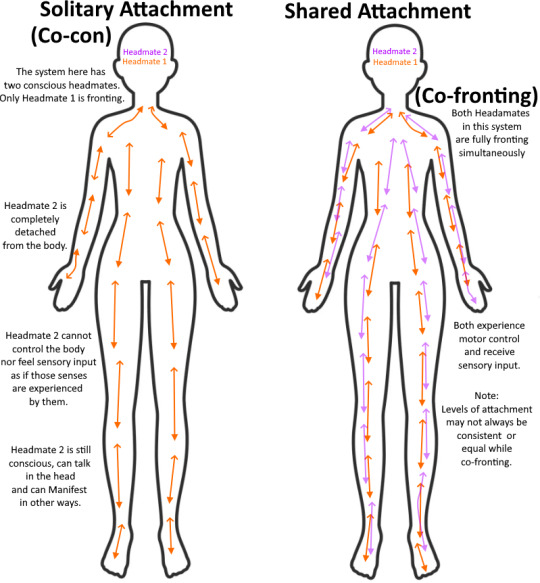
Any of previous attachment types may be experienced by multiple headmates at once. Multiple headmates feel like the whole body is theirs and share control over it simultaneously. Shared attachment can also be over specific limbs, where multiple headmates feel like the limb is theirs at once.
If only one headmate feels attached to the body or limb, this is solitary attachment.
When multiple headmates are controlling the body, this is usually called co-fronting.
How to use the language?
One thing I often struggle with is putting our experiences into words.
A lot of plural language is vague and has multiple conflicting meanings. Part of an issue with having such a large community made up of many smaller communities.
What one person means when they say they're fronting may not be what another means.
This allows us to more easily describe and compare different plural experiences.
For example, a distinction for our partial possession vs our proxying.
When I partially possess an arm, I fully experience that arm as if it's mine. I experience both afferent and efferent locational attachment to that specific limb. If using possession and attunement terms, this may also be considered Attuned Locational Possession or Partial Attuned Possession.
In contrast, when proxying (typing while somebody else is fronting,) I don't feel like the hand belongs to me. I send signals through them, the words typed out are mine and coming from me, but the fronter still experiences the hands as if the hands belong to the fronter. I experience a locational efferent attachment (sending motor signals) and afferent detachment (an absence of sensor signals) to the hands, while the fronter may experience afferent attachment and efferent detachment to the hands. This can also be considered a form of Unattuned Locational Possession of the hands.
Breaking it down!
Full body Attachment and Detachment:
"I'm in complete control of the body, everything that happens to it is happening to me."
Full Fronting (full body efferent and afferent attachment.)
"I'm in control but everything feels like it's happening to someone else, as if I'm outside the body."
Complete Unattuned Possession (full body efferent attachment and afferent detachment.)
"I can feel everything but it's as if someone else is controlling my actions and making me act things out."
Complete non-possessive Attunement (full body efferent detachment and afferent attachment.)
"I'm a spectator watching while someone else controls my body. Everything that happens is happening to them and I just exist in the background."
Complete Detachment (full body efferent and afferent detachment.)
Partial Attachment and Detachment:
"I have total control over this limb, and feel through it as if it's mine."
Partial Attuned Possession (localized efferent and afferent attachment.)
"I can control this limb but I feel like it's someone else's and don't feel these sensations are happening to me."
Partial Unattuned Possession.(localized efferent attachment and afferent detachment.)
"I can feel through this part of the body as if it's mine, but I have no control over it."
Partial non-possessive Attunement (localized efferent detachment and afferent attachment.)
"I can't control this limb and I feel like it belongs to someone else."
Partial Detachment (localized efferent and afferent detachment.)
Things to consider...
While writing this, there were some experiences that were hard to categorize. This is especially true of unconscious reactions. If you tickle a headmate's mindform who is co-con but not fronting, and their reaction causes the body to jolt, do these sorts of automatic and unconscious reactions constitute a form of Efferent Attachment?
This model is still not comprehensive. But I believe it's a good starting place for understanding fronting experiences.
211 notes
·
View notes
Text

[TEXT ID: this system naps a lot due to chronic fatigue]
[IMG ID: a grey-ish blue rectangular box with an icon of a crescent moon with two Zs next to it to the left, with the text 'this system naps a lot due to chronic fatigue' to the right.]
–
Like & Reblog if you use!
(Reblogs can be private)
71 notes
·
View notes
Text
I know that being a system means you're rather different from other parts inside, but that doesn't mean you can't share the same traits or habits:
Some systems don't have distinctive handwritings that can be distinguished from one to another
Some systems don't have a jarring difference when it comes to using clothes or style of fashion
Some systems don't have a separate accent from one another, they all speak the same, and use similar words
Some systems don't have varying amounts of skills or proficiency, they all have it evenly the same throughout, not lesser nor better than others
Some systems don't have their specific disorder affecting just one alter, it affects everyone collectively too
Some systems don't have opposing opinions or ideas from each other, they all share similar life views and perception
Systems being different is true to an extent, but since multiple alters share one brain, it's common to find overlapping qualities among them as well.
What other kinds of traits do you all similarly have, or could be indistinguishable among systems? Join in and share them here!
- j
2K notes
·
View notes
Text
personally we really dislike being part of a system, we all kinda wish we had our own individual bodies and that having to share a brain with others, especially knowing half of us don’t get along, is something that we wish we didn’t have to do.
we wish this wasn’t our reality.
i see very few systems talk about feeling this way publicly, but this is how we feel about it.
295 notes
·
View notes

